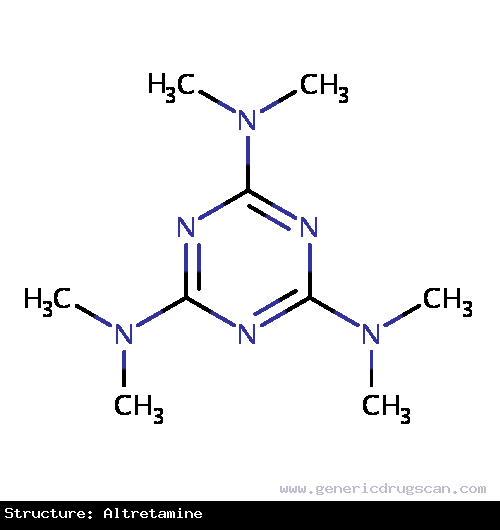Altretamine Drug: Indication, Dosage, Precaution, Side Effect , Storage, Category Type and corresponding Brands - www.genericdrugscan.com
Altretamine
Drug Status in USA : ApprovedDrug Status in Canada : Approved
pronunciation
pronounced as (al tret' a meen)
Why is this medication prescribed?
Altretamine is used to treat cancer of the ovaries (cancer that begins in the female reproductive organs where eggs are formed) that has not improved or that has worsened after treatment with other medications. Altretamine is a medication that is in a class of medications called antineoplastic agents. It works by slowing or stopping the growth of cancer cells in your body.
How should this medicine be used?
Altretamine comes as a capsule to take by mouth. It is usually taken four times a day (a dose after each meal and a dose at bedtime) for 14 or 21 days in a row. This cycle may be repeated once every 4 weeks depending on your response to the medication. Take altretamine at around the same time every day. Follow the directions on your prescription label carefully, and ask your doctor or pharmacist to explain any part you do not understand. Take altretamine exactly as directed. Do not take more or less of it or take it more often than prescribed by your doctor.
Your doctor may adjust your dose of altretamine depending on your response to treatment and any side effects that you experience. Talk to your doctor about how you are feeling during your treatment. Do not stop taking altretamine without talking to your doctor.
What are the precautions to be followed?
Before taking altretamine,- tell your doctor and pharmacist if you are allergic to altretamine, any other medications, or any of the ingredients in altretamine capsules. Ask your pharmacist for a list of the ingredients.
- tell your doctor and pharmacist what other prescription and nonprescription medications, vitamins, nutritional supplements, and herbal products you are taking or plan to take. Be sure to mention any of the following: cimetidine (Tagamet), isocarboxazid (Marplan), phenelzine (Nardil), pyridoxine (Vitamin B6) and tranylcypromine (Parnate). tell your doctor if you have ever received or taken certain chemotherapy medications such as bendamustine (Treanda), cisplatin (Platinol), carmustine (BiCNU, Gliadel Wafer), cyclophosphamide (Cytoxan), ifosfamide (Ifex), lomustine (CeeNU), melphalan (Alkeran), procarbazine (Mutalane), temozolomide (Temodar), or thioguanine. Your doctor may need to monitor you carefully for side effects.
- tell your doctor if you have nervous system disorders or blood disorders. Your doctor may tell you not to take altretamine.
- tell your doctor if you are pregnant, plan to become pregnant, or are breast-feeding. You should not become pregnant or breast-feed while you are taking altretamine. If you become pregnant while taking altretamine, call your doctor. Altretamine may harm the fetus.
What are possible side effects of this medication ?
Altretamine may cause side effects. Tell your doctor if any of these symptoms are severe or do not go away:- nausea
- vomiting
- loss of appetite
- unusual tiredness or weakness
- dizziness
- pale skin
- fainting
- skin rash
- itching
- hair loss
- fever, chills, sore throat, ongoing cough and congestion, or other signs of an infection
- unusual bleeding or bruising
- bloody or black, tarry stools
- bloody vomit
- vomited material that looks like coffee grounds
- bleeding gums
- small, round, red or purple colored spots on the skin
Altretamine may cause other side effects. Call your doctor if you have any unusual problems while taking this medication.
How to store the medication and dispose it of after its use later?
Keep this medication in the container it came in, tightly closed, and out of reach of children. Store it at room temperature and away from excess heat and moisture (not in the bathroom).
Unneeded medications should be disposed of in special ways to ensure that pets, children, and other people cannot consume them. However, you should not flush this medication down the toilet. Instead, the best way to dispose of your medication is through a medicine take-back program.
Drug Category/Class
- Immunosuppressive Agents
- Antineoplastic Agents, Alkylating
- Antineoplastic Agents
- Antineoplastic and Immunomodulating Agents
- Other antineoplastic agents
| Prescribed | For use as a single agent in the palliative treatment of patients with persistent or recurrent ovarian cancer following first-line therapy with a c... |
| Weight : | 210.2794 |
| Structure | Altretamine |
 | |
| Formula | C9H18N6 |
Altretamine has 1 Brands listed
| Cantrat (50 mg) |
Search Generic Drugs alphabetically
